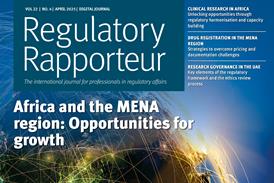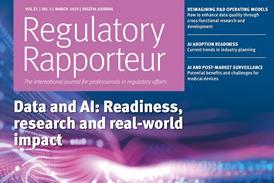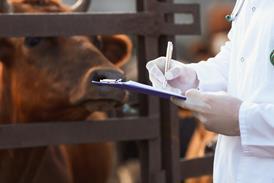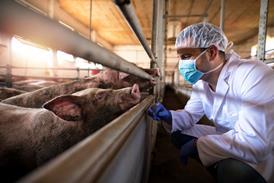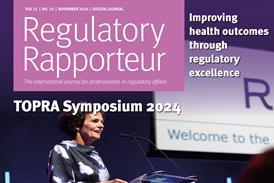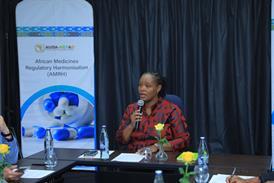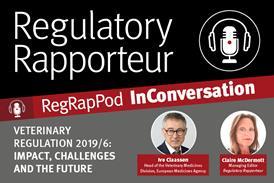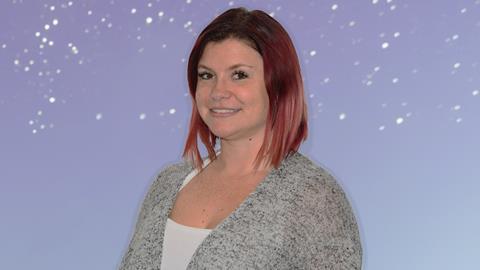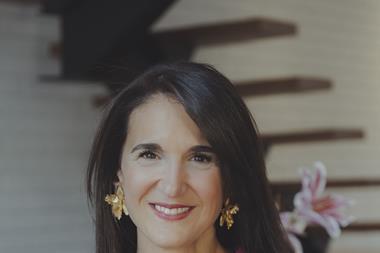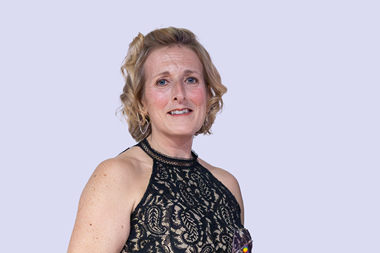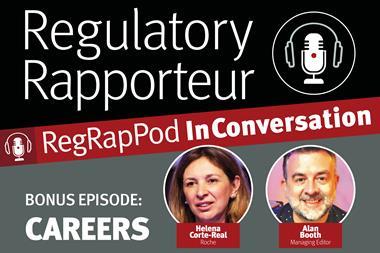Michelle Blake, Associate Director and Senior Regulatory Consultant at DLRC Ltd, and winner of the ‘Contribution’ award at the 2024 TOPRA Awards for Regulatory Excellence, discusses her career path in regulatory affairs and gives advice on how to develop your skills and go that extra mile.
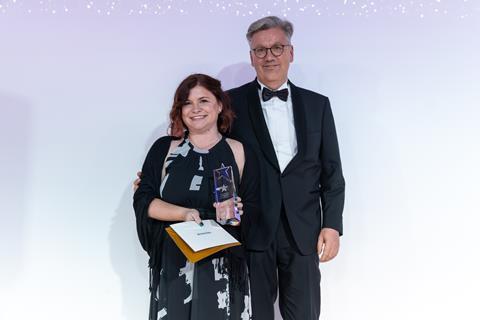
Q: Firstly, tell us a bit about your ‘Contribution’ award nomination. Do you think there was one thing in particular that led to it?
A: I don’t think it was one thing in particular; I feel my nomination was more of a holistic view of everything that I’m currently doing.
What I really like about my job is the mix of different work. I contribute professionally with my regulatory skills through the client work that we do, but I also support members of DLRC directly through my subject matter expertise support and in my role as a team leader. So, I think it was a mix of all those different aspects.
Q: Can you tell us a bit about your current role and your areas of expertise?
A: I’ve developed my regulatory affairs career at only one company, starting at the very beginning as a regulatory executive through to being a senior consultant and leader, managing eight people. That has involved a bit of a mind shift, from having a junior role to being a senior regulatory professional.
As part of that, I have been incredibly lucky to grow my career around my interests in clinical development. I’ve been able to share my experiences with the wider DLRC team, which has given them visibility that I’m someone they can go to for advice regarding clinical development regulatory aspects.
I’m also the paediatric subject matter expert within the company and am part of a paediatric working group, so I’m seen as the ‘go to’ person in that area. So, it’s a two-way thing: I support people in the company with any paediatric work that we are doing for clients on a day-to-day basis, but equally, if we have scoping calls with potential new clients, then I’m the one to support for that. Additionally, if we have a really difficult challenge with broader aspects impacting paediatric development that we’re working on, I often get involved with that too.
In general, it’s very important for me to help other people when needed. Everyone gets busy with projects at times, but I always try to make time to support people if someone wants to run something past me, or needs some mentoring, for example. So, for me, it’s nice having those different elements in my day-to-day job.
Q: Is there a strategic side to your role?
A: Yes, and I think it’s around having that visibility. So, if I’ve been working on a really interesting project that’s been quite unusual and I’ve learned a lot, I make sure that I pass that knowledge on to the wider team. For instance, we have Lunch and Learn sessions within our company, so I’d suggest I lead a session on that particular topic so that other people know what I’ve been working on and can learn from it.
Equally, in terms of more junior people in our company, I think it’s important, even if they’re tasked with administrative or operational aspects on a project, that they get to hear the strategic conversations that I’m having with clients. So, while they’re not directly involved in the strategic aspects themselves, they still have the opportunity to see and hear what’s being discussed, which then helps them with their future development.
Q: What led you to a career in regulatory affairs?
A: I did a degree in biomedical sciences and as part of that, had a placement in a hospital lab which I absolutely hated! When you graduate, it’s quite difficult to get your first role, so I naturally applied for biomedical jobs. But I actually found an advert for a graduate job working as a regulatory affairs professional, which was science-based and working in an office. I had previously worked in an office and I knew I enjoyed it so I applied for it. As part of the application process, I had to do a presentation on why I wanted to work in regulatory affairs. That really made me look into the role and, once I had, I saw that it is really difficult to get a job within regulatory affairs as a graduate, which made me realise that this was a great opportunity. Hopefully it’s easier now but, at the time, it was usually a job that you moved across departments to get.
It’s difficult to know what your options are when you’re coming out of university, knowing that you love science, but don’t want to work in a lab
The job looked really attractive to me and very luckily, I got the role. At the time, there were only five of us in the company. Now, we have three different offices: one still in the UK, but also one in Boston and one in Munich, and we have 100 employees, so it’s been nice to see the company evolve and grow over time and be part of that.
Q: Why do you think a career in regulatory affairs is something that people don’t automatically think about?
A: I think it’s better now; the TOPRA Regulatory Careers Live event means there is definitely more exposure to the profession. As a company, we also do a lot of work with students. We have several of our junior members of the team going into schools and saying, ‘I work in regulatory affairs; this is what it is’ to give regulatory affairs more exposure.
It’s difficult to know what your options are when you’re coming out of university, knowing that you love science, but don’t want to work in a lab. Visibility is definitely better now, but it could be better still.
Q: What skills do you think have been particularly important during your career advancement?
A: I achieved my MSc in regulatory affairs at TOPRA, which I think helped enormously in honing my skills in different areas. It also really helps with networking because you meet lots of different people, which was brilliant.
In terms of soft skills, communication with people from different cultures has been really beneficial. Working with people across the globe is something I really enjoy about working in regulatory affairs, and every day, I talk to people in different parts of the world. So having an awareness of different cultures is quite important and is something you don’t tend to get taught.
Learning about regulatory strategy has also been hugely valuable. While I started out in my career as a junior member of the team, learning from senior colleagues and developing those skills has definitely benefitted my career overall.
Standing out from the crowd is essential. To do this, try and think outside the box for ideas and initiatives, and don’t be afraid to voice your ideas
Q: How do you feel that regulatory approaches differ across the world?
A: As expected, there is a lot of focus within drug development with regards to the US regulatory requirements. I mainly focus on European legislation, and Europe is still a huge market. However, when you get to the much smaller markets you have to remind people not to forget about the UK and Switzerland, especially in the UK after Brexit. Where you have developing countries and regions that are becoming more progressive, but their regulatory basis is still quite limited, learning about what’s required in these different regions is important but can be challenging too.
We saw from the TOPRA Symposium that many clinical trials are now conducted in Asia (including China) because of the amount of regulatory hurdles here in Europe. There’s still a balance to be achieved between the length of time it takes to get clinical trials approved and completed in different regions, versus the quality of the data you’re getting out of it.
Q: What do you think is important when leading a regulatory team?
A: I think the ability to coach and mentor is important, to encourage team members to have ideas of their own and to take ownership of the work they’re doing. Just because I’m leading a team doesn’t mean that they can’t also lead people that are more junior to them, and delegate work appropriately.
While it’s also important to be present and provide support when needed, I also encourage self-thinking. An example is when someone needs help but has read the guidance first, thinks of an answer for themselves and then runs it by me, rather than coming to me for the answers in the first instance.
Equally, playing to people’s strengths with the work they’re doing is hugely beneficial. But, of course, it’s important to help develop their areas of weakness, and feedback plays a massive part in that, because they can’t improve on what they don’t know. Sometimes it’s quite difficult to give constructive criticism, not to be mean but to encourage them to improve for themselves.
Q: Your award nomination mentions ‘going the extra mile’. Why do you think that’s important and how do you go about doing that?
A: I think everyone should strive to do their best, but it’s about more than that. It’s also about creating the right conditions for people to achieve their potential. Because I work for a consultancy, it’s also important that we’re doing the best for our clients, and ultimately what we’re doing is helping patients. I think it’s really important that people keep that in mind because, based in an office, I think we often forget that there are patients benefitting on the other end.
So, it’s lots of different aspects that come together, and it’s not just about the one person. It’s about working as a team, and with all the stakeholders, to ultimately improve outcomes for patients.
Q: What are the key changes you’ve seen during your regulatory career?
A: The first thing is technology. I remember when I first joined DLRC, we had paper submissions. One in particular involved a variation where we had one document that we had to manually take out individual pages of a folder and replace them with updated versions of the page. I heard that lorries would come out and pick up marketing authorisation application (MAA) submissions. That seems crazy now. When I was more junior, I had to put compact disks together and get a courier to collect them. Luckily, we now have electronic submissions which makes life a lot quicker and easier!
The other great technological advantage is video calling. Being able to see people during meetings makes a big difference. With previous clients, I would work with them for years and I would never even know what they looked like, whereas now it’s a lot more collaborative and helps to build rapport with people.
From a regulatory and pharmaceutical standpoint, advanced therapy medicinal products (ATMPs) are massive now and this is where a lot of work is being done in terms of development and approval pathways. ATMPs take up a lot more of my time than they used to. Because each ATMP is unique, more collaboration with regulators is needed, so a lot more work is needed for their development. The other problem for patients with ATMPs is that they are very expensive when they come onto the market. One gene therapy developed cost around £1.8 million per treatment. One treatment may be all that’s needed but it’s obviously problematic for countries to pay that for one patient.
The changes brought about from the Clinical Trial Regulation (CTR) in the EU have be difficult as well for both ATMPs and generally. One clinical trial application (CTA) submission we worked on needed 150 questions to be answered in 12 days, which was challenging. I hope that the regulators become a bit more helpful in terms of support with CTA scientific advice to avoid the challenges seen with CTAs, which we have seen more of already through initiatives and pilots offered from the Accelerating Clinical Trials in the EU (ACT EU) initiative.
Q: How do you imagine regulatory affairs will change during the next ten years and what is your advice for staying ahead of the curve?
A: One of the hot topics at the moment is artificial intelligence (AI) and it’s definitely something we can’t ignore. People were a bit nervous when the internet was first developed but we use it constantly now, both personally and professionally. I think it will be the same for AI. Some people are concerned that it will take away our jobs, but I think it will be used as a tool going forward to aid the work we’re doing and hopefully it will help get things done quicker.
Equally, I think regulatory has been traditionally seen as a limiting step for clinical development, and this has not helped as legislation gets tougher. So, I’m hoping that there will be pathways and expedited initiatives from health authorities to make this an easier process.
In terms of advice for keeping ahead of the curve, I think keeping abreast of developments within regulatory is hugely important. Look at what health authorities are offering in terms of collaboration moving forward and at what you can get from them in terms of support. Digest information that you are given at conferences, such as the TOPRA Symposium. It’s great to hear insights from conference speakers that you would never be able to read anywhere else, such as how the FDA and the EMA collaborate together. If you’re going to those events, you’re also able to network and understand other people’s experiences which makes it easier to look for future trends. It’s a constant learning process.


